It was the month of July in a part of the world that defines itself by a two-season system: rainy or dry. After some months of the most stifling heat a live species should have to endure, I was happy to be smack in the middle of the rains. I dare say I was not the only one. In a country where 70% of the population depends on rain-fed agriculture, the rainy season was a source of great relief for farmers, market traders, thirsty livestock, and lest you forget, Canadian volunteers living in Nigeria. In my new acclimated body, temperatures of 30 degrees Celsius were the equivalent of a pleasantly mild fall day in Canada.
On this particular road trip, we were driving up a newly paved (Hallelujah!) winding mountain road in southeastern Nigeria to reach the surprisingly picturesque hilltop villages in the Obudu Plateau. On my right were views of lush, rolling hills – the kind you might see in Scotland. On my left a haggard looking man squatting with his pants around his ankles beside a useless piece of aluminum siding propped ever so poorly, giving little privacy in this makeshift restroom. I instantly closed the cap on my water bottle and vowed I would not pee for the next 48 hours for fear of mooning an entire village with my white ass.
Obudu was in the northern part of Cross River State and stood 1500 meters above sea level, helping to create the most refreshing climatic conditions in the country. In the few moments every afternoon when the sky cleared, my view over the Sound of Music landscape led into neighboring Cameroon. The border between these countries acted much like a sieve with Cameroonians trekking the three hours into Nigeria for weekly market days. Goods such as meat, fish or slippers (flip-flops) were traded between the two West African countries.
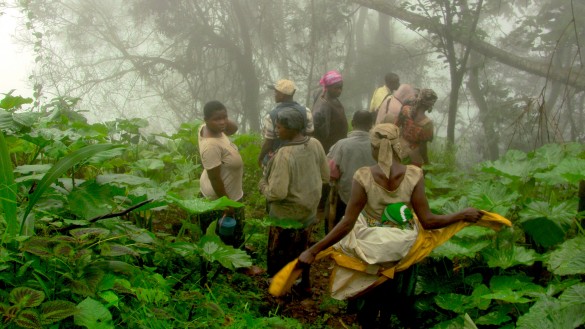
Capitalizing on this picturesque English countryside, the former Governor of Cross River, Donald Duke (not to be confused with Donald Duck), built a “state of the art” hotel perched high enough to forget about the poverty below. In case you were wondering about the always-present contrasts, the local villagers employed at the Ranch could hardly afford a bag of rice and lived mainly on a cheap, bland, starchy fermented staple derived from Cassava, called akpu.
“State of the Art” is a term I heard often in Nigeria, normally to describe a cockroach infested hotel room with electric wiring fit for an execution (my execution), but this was the first time a place actually lived up to the expression. Its Frank Lloyd Wright-esque décor mixed with African safari round huts, wooden panels and extinct and stuffed game reserve, passed my test: would my parents stay here? I looked around and nodded to myself…yes.
Having described the beauty of the ranch, don’t let me confuse you. I did not stay at The Obudu Cattle Ranch. Did Not. I stayed at the top of the picturesque mountains, but being the volunteer that I am, I stayed with the people in a nearby “villa” which consisted of two stained mattresses on the ground of a brick-mud hut, which our partner organization rents out for a very affordable 1,000 Naira a month (USD $6.50).
When it was time to rest our weary heads, my two male colleagues slept on one mattress and I had the other. Thankfully, I was well versed enough at that point to carry my own sheets and after doing my usual smiles and nods to reassure everyone that I was not a princess and I had no problem staying with the common folk, I proceeded to pull out my mosquito net and wrap myself up in a tight cocoon. I need not describe the rather fitful night of sleep I endured with the snoring Nigerian men to my right and the fear that my toes would be gnawed off by some strange mountain rat.
I awoke early in the morning and made enough of a fuss about my neeeeeed for coffee, that our lovely guide had hot water waiting. Must please the Oyibo (the white person)! The truly horrible instant coffee that I’d grown accustomed to was a perfect compliment to the scenic setting.
Watching a village wake up could make any spoiled westerner feel ashamed. At home our first major decision of the day balances on how much fat we want in our morning coffee. Skim milk, 2%, 1%, half and half or soy?
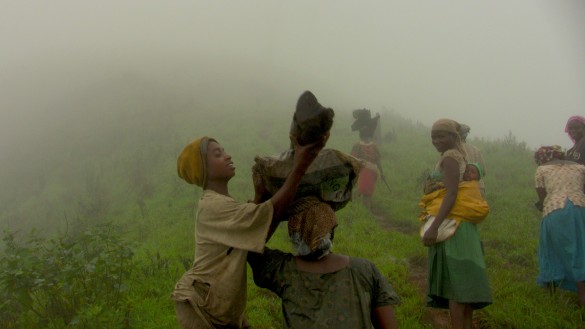
Daybreak in villages is always the same view with a different backdrop. In Obudu, the morning mist hovered low and heavy providing a theatrical landscape. I kept thinking there was a stagehand somewhere nearby turning the smoke machine on. At the first hint of light the women stirred about in their muddy wrappers, dressed in tattered second hand T-shirts emblazoned with some foreign sports team logo. Mornings are particularly difficult on children who can be found leaning sluggishly against tattered huts, their tired head propped up on their knobby knees. If my morning chore consisted of a long hike to fill up water buckets double my weight, I too would rather sleep a few minutes longer.
I didn’t think there was such thing as brrr in Nigeria, but the Plateau temperatures during the rainy season probably drop to about 15 degrees Celsius at night and given my new identity as an African, I was officially f-f-f-reezing. The irony of being an extremely ill-equipped Canadian did not go unnoticed in this new Arctic. I was wearing everything I owned, but looked naked compared to the ridiculously large parkas my thin colleagues were hiding under, ensuring their readiness for that trek in the North Pole. It could have been -30 degrees Celsius.
Shivering, I rolled my camera to record the morning’s happenings and immediately noticed the gender inequality in my frame. Women balanced buckets of water atop their heads, chopped firewood with meager axes, balanced pots precariously on hot coals, and pounded cassava with their jumbo-sized mortars and pestles creating that rhythmic thumping melody echoed all over West Africa. It was Planet of the Women.
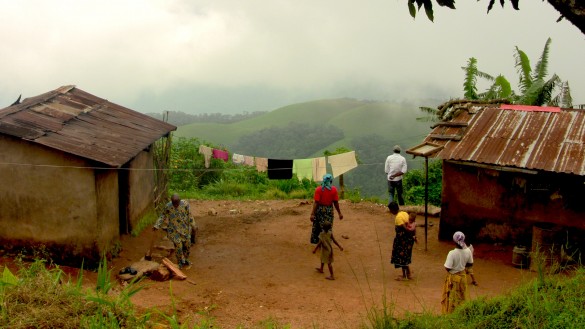
On the other side of the spectrum, grandfathers, fathers, brothers, and sons, sat on the floor lazily with legs outstretched, while their grandmothers, mothers, sisters or wives catered to their needs swiftly like highly functional tornadoes. Breakfast in this village consisted of, yes, more akpu, served up with a wallop like an extremely unhealthy and generous portion of mashed potatoes. Nigerian etiquette dictates using the fingers of your right hand to pick a portion of white goop off your plate, roll it around from one finger to the next making the sticky stuff a softer ball of mush. When ready dip said carbohydrate into your soup – a mixture that might include intestines and other sloppy organisms – enjoy!
As a member of the female race, I should have been slaving away cooking the food but as a member of the white race, I was often the only woman eating on these village trips. The others tended to me like I was a visiting Queen. Having grown up with an English father who taught me manners, I never could get used to this kind of treatment. I offered my seat to the matron of the house, and tried to clear my dirty plate, but it was insulting to try and help. I was polite if I lapped up every bit of starch from my plate, and sucked my fingers clean. Better to take this lesson in gratitude.
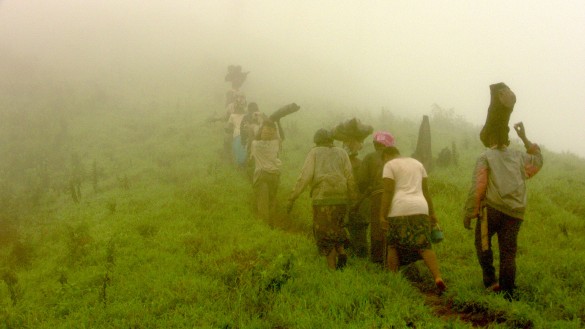
I’ve always lived in cities, where I could walk to the corner supermarket, and buy my vegetables, dairy and grains from one store. Where does the food actually come from? Why somewhere out there of course. In my imagination our staples came from vast flatlands and fields like those in, let’s say, Iowa. John Deere tractors plowed landscapes of yellow and orange hues as children ran mischievously through high stalks of maize. Tall male farmers in blue overalls worked these fields, harvesting goods for supermarket shelves all over North America. Thankfully my year in Nigeria broadened my narrow view of farming.
Armed with nothing but their bare hands and a machete, the women of Obudu trek an hour down a slippery, muddy, steep slope towards their farms, where they will till, sow seeds or harvest their crop. These were not flat lands and it was hard to imagine anything could go grow in this rugged rainforest. After a long afternoon in the blazing sun, or drizzly rains, they trudge back up the mountain, gripping the ground with their flip-flops or bare feet, carrying crops and heavy tree trunks (for firewood) atop their head.
For the love of the camera, and to prove to myself I was still somewhat of an athlete despite my new starch-filled gut, I decided it was necessary to follow these superhuman females down the mountain to the depths of their farms. Everyone was worried. The chief of the village muttered in Igbo with hushed tones to his wife, who whispered to my colleague, who translated to the Oyibo. “E no Easy o!”
I licked the soup off my finger with an air of cockiness unflattering for even the most athletic of women – which I was no longer. If I had suspenders on I would have snapped them with brash disregard.
They thought I wasn’t strong enough? I was in Nigeria. I wanted to experience and see it all. I was tough! I filmed the maggot filled guts of dead cows baked in the desert sun for days. I filmed in the face of red inexplicable strange dots spreading across my body. I slept in sand dunes while an army of ants bit a floral design on my backside. Even Malaria induced vomiting in a quaint village did not prevent me from pressing the record button.
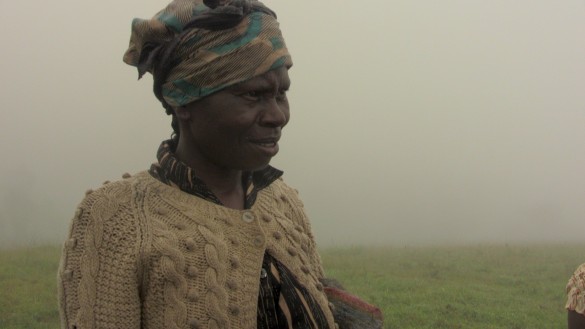
But this morning in the Chief’s understated living accommodations, on a stool fit for a four-year-old with my knees up to my ears, these villagers simply saw a frail white woman. All this concern only made me more determined than ever to show my toughness. It was just a walk after all. Puhleasssse, the Oyibo can hike. I used to hike everyday in California. There were canyons over there. I’m fine-o!
And so we set off to work on the farm, walking through village huts as the fog draped a growing group of women led by Lydia, the chief’s wife. We latched on to her, not because of her royal status, but because she had the best English of the group. When I say, English, I mean Pidgin – it was loud, fast, slightly grating at times, but served a greater purpose. I might say I have to go down to the farms to gather my harvest for dinner this evening. Whereas a pidgin speaker could spit that out in 5 words: carry come farm and chop.
Marching along what I now can dub as the flat and easy part of the journey, we passed women hanging clothes on the line to dry – an impossible feat given the constant dampness outside. Lydia would bark to her Sistahs, “Come now”, and within seconds the conga line to the farm grew longer. I was in a good mood, walking alongside these female gladiators. We smiled at each other, and I gave them much to laugh at while practicing my few words of pidgin. How now? How de night?
Just when I thought this isn’t so bad, we reached the edge of the plateau and began the descent into the folds of the rainforest that looked a lot like Gorillas in the Mist. My new friends wore their tattered yarns, bare feet and a few of them carried their children in a swath of colorful fabric tied tightly to their backs. Unable to leave the Oyibo, Sam and Peter reluctantly joined the procession still huddled in their parkas, of course. If at first the villagers thought I would be the lame leg, I figured these men surely changed their minds.
The treeless high grounds gave way to tall-grasses, and soaring canopy trees whose leaves hung low and swept the floor. The rainforest was alive with sounds of birds, chirping crickets, and wind rustling through the leaves. Unfortunately looking around at my surroundings soon became a hazard. The earth below was less of a path and more the beginnings of a mudslide. My worn out Nike trainers slid left and right, unable to grip. In order to stay upright I walked as if a pickle was wedged right between my butt cheeks, clenching my glutes and thighs fiercely as I navigated the steep K-2 slope. I carried my lightweight camera at the ready and slyly used director-speak whenever I needed a break. Please halt, I do believe this is a splendid shot.
Everyday, including Sunday after church, these farmers hike to their farm. There is no choice, no decision to be made, no options. If you want to feed your family, you have to work the land. One mother pointed to her pregnant belly and eloquently explained, “fo’ child”. It was simple. We live in a world where everything is a decision including which mocha frappachino to order. Walk into the supermarket in the Western world and you might spend twenty minutes in the rice section choosing between Basmati, wild rice, brown rice, white rice, or coconut rice. In Nigeria, you walk down the dirt road to the African mama with the big headdress selling white rice cooked in a massive kettle pot. Eat it or don’t – that’s your only choice. Sometimes I wished my name was Karen Shoemaker, and my destiny was thus determined.
We had been walking about an hour, and my feet slipped more easily with each passing step. Where the fuck was this farm? The woman directly in front of me caused me the most shame as she skipped down the mountain eight-months pregnant wearing flip-flops. I tapped her shoulder quietly and whispered, “how long now?” – but not because I cared. She waved her hand in one direction or another indicating somewhere ever so far in the distance, “it’s fahr now!” Lydia, still the warrior leading the group stopped, turned and marched straight up to me, grabbing my hand gently with a furrowed brow, “Oyibo, you don tire-o?”
“No, no. I’m OK. Oyibo is not tired.” They all laughed at my response. No not with me.
Hi ho, hi ho, down the plateau we continued to go and with the constant precipitation and dampness, the soil really was very slippery and the hill really was steep and the hike really was long. “Slowly, slowly, Oyibo”, the long train of Nigerian women called out with growing concern. What was that sound? Me. I was panting. Right foot, left foot, right foot, left foot. I was gripping my jaw as much as my glutes. Don’t fall, don’t be tender. I whispered sweet words of encouragement to myself, but it didn’t help. I put my right foot in front of my left foot, but suddenly there was no ground, just soggy leaves. I fell, I rolled, I grabbed at the grass, and as fast as I went down, I popped back up. Perhaps no one noticed the white lady with her perfectly stupid backpack, her annoyingly fancy camera and her dashing trainers, rolling down a mountain?
Oh but they noticed… “Oyibo! Sorry-o! Oyibo, you fine-o?”, they screamed and ran to give me a hand. My shock – yes, I fell – led to hysterical laughter as I watched their concerned faces. I continued laughing as I wiped the blood from my fingers and removed the twigs stuck in my hair. And I continued laughing as I tried to prove to these women that I was still very much alive and well and they would not incur the wrath of God for killing a white woman.
Finally I had to admit that in Nigeria I actually was weak. I couldn’t sprint down a hill to my farm barefoot and I certainly couldn’t ascend with a tree strapped to the top of my head. We turned back, before I hurled myself right off the mountain.
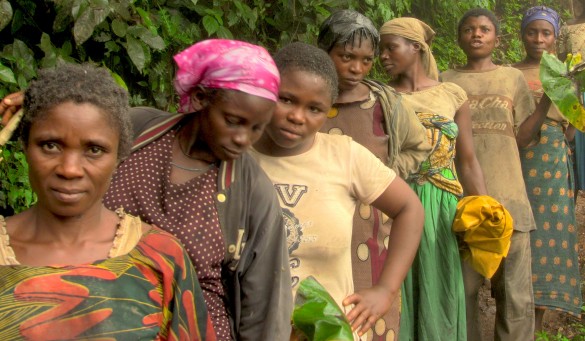
Dangerous doesn’t describe what these women endure on a daily basis. Back at the top of the mountain the group splintered off to return to their homes and continue their afternoon chores. Chopping the wood they just collected, fires were stoked and water fetched. No rest, no hot bath, and no warm cup of tea. Work, work, work.
I sat on a rock nearby and watched Lydia’s weary body run back and forth from her outdoor kitchen to her mud-brick house. The chief was ready for dinner.
The trek had been grueling, but the camaraderie amongst this female clan gave the routine a certain spirit. Sure it would be nice if the farm was in their backyard, but some part of me believes they enjoy the “women only” trek. It might be the only time these Superhumans get a moment of freedom away from their demanding husbands and tedious chores.